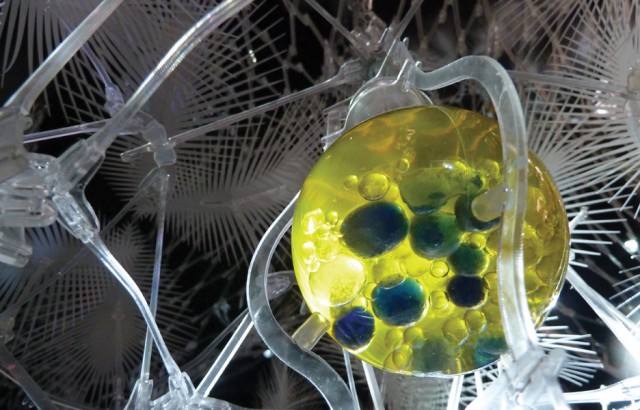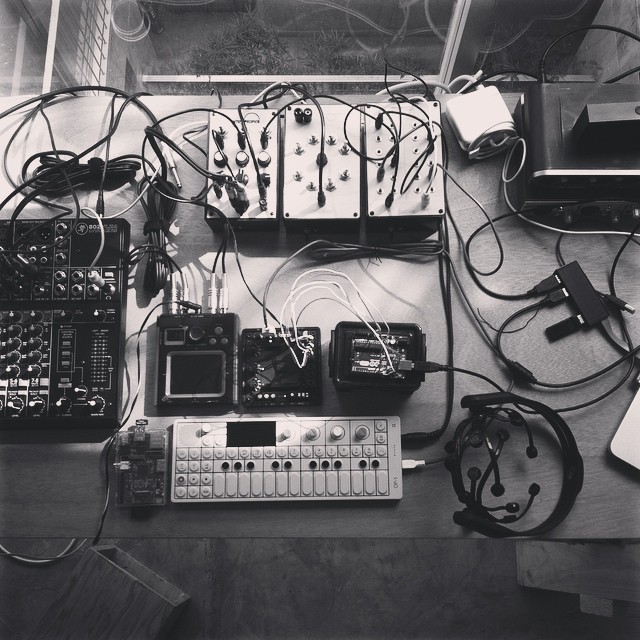The music technology industry continues to pump out things with knobs, and things that sound like the 1970s – sometimes, literally so. And we love them for it.
But if you feel dizzy after all this tumbling backwards in time, let us take you on a ride back into the future. It’s the reason we’re in Berlin and not Anaheim this week, and I think you’ll enjoy it. A lot.
CDM joins again with CTM Festival to explore the possibilities for music’s future in an intensive laboratory of creation, featuring speakers, on-the-spot hacking and experimentation, and finally a live performance showcase in which new ideas are tested onstage in front of an audience. I’m thrilled to get to co-curate this year’s edition with Leslie García from Tijuana, Mexico.
The action starts tonight at Kunstquartier Bethanien, with Leslie and Marco Donnarumma playing live in the opening of one of Europe’s most adventurous music festivals, launching the exhibition for this year. Then, next week, we’re hosted by Native Instruments in their office complex with an incredible group of artists, researchers, hackers, and even experts on biology and the human body in six days of hacking and public lectures.
And do we have some interesting people joining us in conversation. Rachel Armstrong has found new solutions to sustainability by literally growing architecture – and looks at music on a microscopic molecular level. See the image at top for the kind of wild world that’s expanding out of the natural universe.
Bio-hacker Thomas Landrain has constructed a no-cost lab for new biological creations in a former squat, dreaming up and building projects like a pen that produces its own ink with built-in bacteria, and will discuss what happens when hacking means biology and not just hard circuit boards. Atau Tanaka, apart from hosting NIME last year and with a resume from IRCAM to Apple, has been at seemingly every twist and turn of notions of working with muscles and brainwaves in music. He’ll help guide us through that history, and where it might lead next. Marco Donnarumma, having made new movement and music performances with muscular sensors, investigates what all of this means for us being a new kind of human.
And we even have a veteran NASA planetary scientist (Kelly Snook) linking Kepler to music making.
The talks are open to the public if you’re in town, but of course we’re doing this for the People of the Internet, so we’ll have recordings of those performances and lecture sessions to share.
My belief is that music technology should be the area that looks forward. We can again be the people folks think to call when aliens are landing. The ones doing crazy things with electricity. The ones who seem to be bringing science fiction into the moment – and then deciding to play a song. Music can animate every discussion of science and technology. So let’s get started.
At top: the living architecture of Rachel Armstrong – don’t miss her e-book on the topic. Below, Leslie García’s live rig, in the quintessential combination of past and future, wires and wildness that is the technology of music performance.
Friday 23 January
Exhibition opening and performances, Kunstquartier Bethanien Mariannenplatz 2 10997 Berlin
19:00 Doors
20:00 Marco Donnarumma
21:00 Leslie García
Marco is again performing with his Xth Sense system. Leslie will work with her neurfeedback improvisation, heard below.
Here’s earlier video of Leslie performing at MUTEX Mexico – with plants.
Pulsum: Live Setup @ Mutek_MX from LessNullVoid on Vimeo.
Facebook event:
UN TUNE – CTM 2015 Ausstellung
HACKLAB
All hacklab public lecture events are free and held at Native Instruments, Schlesische Straße 29-30 10997 Berlin
(You’ll see an enormous Native Instruments sign on Schlesiche – and then smaller signs leading you to the venue.)
Tuesday 27 January
16:00
Rachel Armstrong
“Molecular Music”
Within the first in a series of talks within the MusicMakers Hacklab, Rachel Armstrong elaborates on the use dynamic chemistries and the imaginary auditory qualities of oscillatory landscapes at the microscale to explore a vocabulary of interactions between matter, space and time. This synthesis may be thought of as “molecular music”, which broadens the portfolio of entanglements between chemistry, architecture and musical encounters.
17:00
Marco Donnarumma
“Being Human: Making and Creating with Biotechnologies”
DNA computing, organ engineering, reproductive technologies, and the quantified self. Human body parts and machine parts are taken apart and put together in such sophisticated ways that they uncannily conjure the bleakest cyberpunk fiction.
In the wake of the wild instrumental hybridization of humans and machines, Marco Donnarumma will argue for the potential of biotechnologies as artistic means to critically explore what it means to be human. By undermining the idea that machines are merely devices that we must control, we can understand both human bodies and machines as configurable materials that yield creative and cultural empowerment.
Thursday
29 January
15:00
Thomas Landrain
“Biohacking: Indie Biotech at your Service”
16:00
Atau Tanaka
“Electromyogram Signals (EMG) in Musical Performance”
This talk retraces the use of bio-signal sensors as musical controllers over the last 20 years. The work centres around the BioMuse, developed by Hugh Lusted and Ben Knapp at Stanford University’s CCRMA in the late 1980s.
Atau Tanaka’s own use of the BioMuse’s electromyogram (EMG) function to track muscle tension to control computer-based sound began in the early 1990s. His work continues to the present day with new hardware, but with the continual ethos of an evolving, yet same musical instrument, the underlying principles of operation remain consistent over time.
17:00
Kelly Snook
“Harmonies Untuned: Exploring Kepler’s Worlds with Music Technology”
Sunday
1 February
17:00
HAU2 Hallesches Ufer 32 10963 Berlin
This is the one ticketed event – 8€ (5€ reduced)
MusicMakers Hacklab – Tuning Machines Finale [CTM Festival]
About the speakers
Marco Donnarumma [IT]
Marco Donnarumma is a performer, sound artist, musician and writer. He has played interactive music by amplifying sounds from his body, has induced visitors in altered states of self-perception by feeding sounds from their bodies back to their skulls and bones, has immersed audiences in multichannel sound and video produced by the strain of his muscles while he pulled 50kg stones, and has physicalised digital viruses in the body.
Rachel Armstrong [UK]
Rachel Armstrong is Professor of Experimental Architecture at the Department of Architecture, Planning and Landscape, Newcastle University. She is also a 2010 Senior TED Fellow and a Fellow of the British Interplanetary Society, who is establishing an alternative approach to sustainability that couples with the computational properties of the natural world to develop a 21st century production platform for the built environment, which she calls “living” architecture.
Thomas Landrain[FR]
Parisian bio-hacker and founder of the “DIYbio” space La Paillasse, Thomas Landrain has constructed a zero-Euro laboratory for new biological creations in a former squat, dreaming up and building projects like a pen that produces its own ink with built-in bacteria. Fusing biology with the maker ethos, he’s a hub of a nascent global bio-hacking movement that cross-breeds biology and fab labs.
Atau Tanaka[UK/JP]
Atau Tanaka creates music for sensor instruments, mobile infrastructures, and democratized digital forms. He studied Physical Sciences at Harvard and has a doctorate in Computer Music Composition from Stanford University’s CCRMA, and was awarded the Prix de Paris to conduct research in Paris at IRCAM, Centre Pompidou. Tanaka’s first inspirations came upon meeting John Cage during his Norton Lectures, after which he eventually went on to re-create Cage’s “Variations VII” with Matt Wand and :zoviet*france:.
Kelly Snook
[US/UK]
A former lunar program scientist, Kelly Snook is a singular combination of wearable technology expert, musician, and planetary scientist. Working with two decades’ background at NASA and a PhD in Aeronautics and Astronautics from Stanford University, she is now a collaborator of Imogen Heap and an expert in data sonification as well as contributor to the Gloves Team, which was featured at CTM.13 within that edition’s MusicMakers Hacklab).

